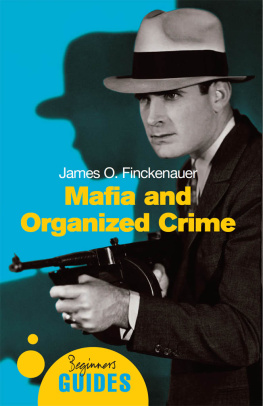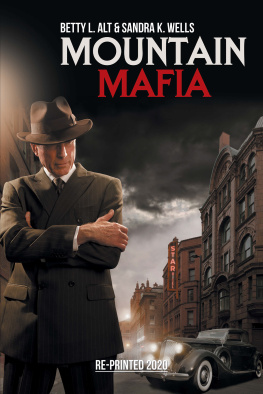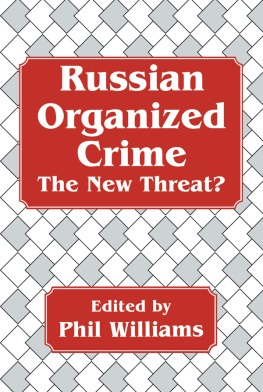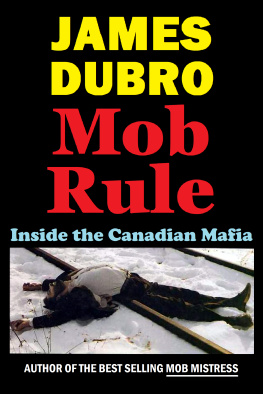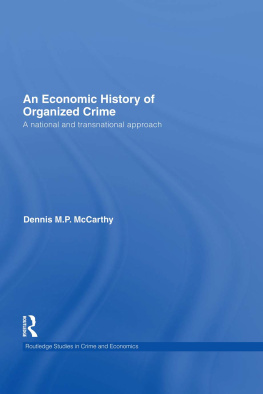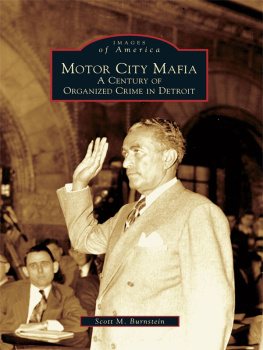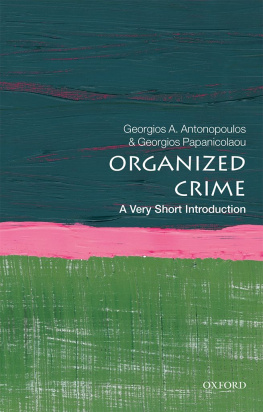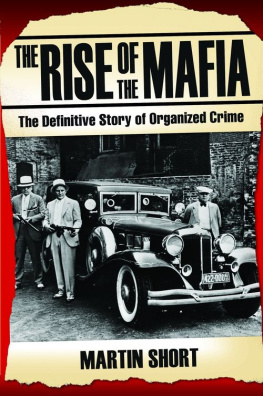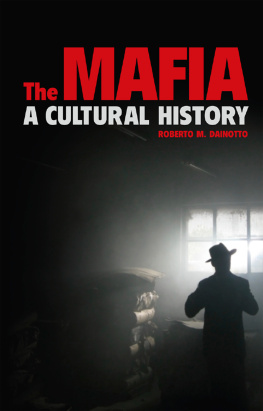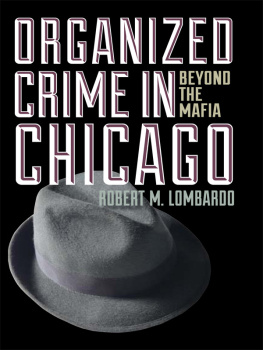Mafia and Organized Crime
A Beginners Guide
ONEWORLD BEGINNERS GUIDES combine an original, inventive, and engaging approach with expert analysis on subjects ranging from art and history to religion and politics, and everything in between. Innovative and affordable, books in the series are perfect for anyone curious about the way the world works and the big ideas of our time.
aesthetics
africa
anarchism
aquinas
art
artificial intelligence
the bahai faith
the beat generation
biodiversity
bioterror & biowarfare
the brain
british politics
the buddha
cancer
censorship
christianity
civil liberties
classical music
climate change
cloning
cold war
conservation
crimes against humanity
criminal psychology
critical thinking
daoism
democracy
descartes
dyslexia
energy
engineering
the enlightenment
epistemology
evolution
evolutionary psychology
existentialism
fair trade
feminism
forensic science
french revolution
genetics
global terrorism
hindusim
history of science
humanism
islamic philosophy
journalism
judaism
lacan
life in the universe
literary theory
machiavelli
mafia & organized crime
magic
marx
medieval philosophy
middle east
NATO
nietzsche
the northern ireland conflict
oil
opera
the palestineisraeli conflict
paul
philosophy of mind
philosophy of religion
philosophy of science
planet earth
postmodernism
psychology
quantum physics
the quran
racism
renaissance art
shakespeare
the small arms trade
the torah
sufism
volcanoes


MAFIA AND ORGANIZED CRIME
A Oneworld Book
Published by Oneworld Publications 2007
This ebook edition published in 2012
Copyright James Finckenauer 2007
All rights reserved
Copyright under Berne Convention
A CIP record for this title is available
from the British Library
ISBN-13: 9781851685264
eBook ISBN: 9781780741659
Typeset by Jayvee, Trivandrum, India
Cover design by Two Associates
Oneworld Publications
10 Bloomsbury Street
London WC1B 3SR
England
www.oneworld-publications.com
Stay up to date with the latest books,
special offers, and exclusive content from
Oneworld with our monthly newsletter
Sign up on our website
www.oneworld-publications.com
Foreword
As above, so below was one of the central tenets of the ancient hermetic philosophies the world in which humans lived was a reflection of the glories of Heaven, but at the same time, the heavens were affected by what happened on the mortal Earth. What connection does this have to organized crime? The underworld is shaped by the upperworld but also shapes it. The decision of the US government to introduce Prohibition reshaped the North American underworld, while the collapse of the Soviet Union unleashed a new form of organized crime on the world. There can be little doubt that organized crime and its pernicious activities has a direct impact on the modern world, whether in facilitating the activities of international terrorists or in polluting the global money supply with dirty funds.
When societies get organized, so too do their criminals, and organized crime has evolved as the shadowy underside of modernization and order. A dark, common, thread runs through human history, from the smugglers and protection racketeers of ancient Rome, to the surprisingly sophisticated economic substructures which supported and flourished on the back of seventeenth-century piracy, to todays cybercriminals and a global drug trade worth an estimated $500 billion a year. Organized crime exists because it supplies needs not satisfied by the legitimate sector, such as narcotics and vice, or inadequately controlled by the state, such as protection rackets. However, it is at its most dangerous when it doesnt just exploit the weaknesses of the state, but it begins to replace it.
Jim Finckenauer usefully draws a distinction between organized crime and mafias. The former is essentially a description of an activity, but the latter is a culture of criminality, a sub-set of organized crime that embeds itself in society by filling needs that in more ideal circumstances would be the preserve of the state. What does it say about the experience of migration to the United States that so many communities, as they arrived, created their own forms of organized crime, from the Irish and Jewish gangs of the nineteenth century to the Cosa Nostra of the Italians? Feeling locked out of the opportunities for which they had made the long and hazardous journey to the New World, the migrants felt disenfranchised, and neglected. In their violent and parasitic way, the gangs offered a sense of identity and opportunity, and social mobility. Why were the yakuza crime gangs of Japan only criminalized in the 1990s, before which they were openly accepted and even respected? To a large extent because the yakuza were considered reliable, because it was felt that organized crime could be used to control disorganized crime and at the same time buttress the power of the existing political and economic elite. Understanding mafias and organized crime helps us understand the wider world in which they operate.
To this end, this useful primer to the phenomenon quite rightly starts with a simple question that begs a complex answer: what is organized crime? Sometimes, the mobsters are easy to identify, a collection of neer-do-wells with no visible source of income but owning flashy cars and homes; involved in the staples of organized criminality, whether trafficking drugs or infiltrating legitimate businesses. The old stereotypes, which were always something of a caricature, are becoming even less applicable in the modern world. Todays OC could as easily be an apparently legitimate businessperson whose portfolio of interests ranges from the entirely clean through to overtly criminal, or who facilitates the activities of more conventional criminals. Or they might be a fringe member of a radical movement, involved in raising funds for political or terrorist operations through crime, but doing so less out of a belief in the cause than for the generous proportion of its income they pocket. In some cases, not only do political leaders engage in organized crime, but local and national governments almost become gangs in their own right, whether for personal enrichment or as in North Korea to raise funds for a bankrupt state. Failing that, gangs may be powerful enough to create their own states-within-states, from the poppy fields of Afghanistan to Moroccos cannabis-growing Rif region.
Global crime is not an organized global conspiracy, but nor is it a random collection of maladjusted thugs, frauds, and psychopaths. It is a complex array of competing, cooperating, stable, fragmenting, local, and multinational organizations. It is powerful, growing, and above all, transnational, something on which Finckenauer has a distinctive perspective, thanks to his experience not only as an academic social scientist but also the former head of the National Institute of Justices International Center. Modern consumers take it for granted that they can buy food from halfway round the world, fly north for skiing and south for the sun, and talk with their friends on their cellphones while traveling to work. These explosions in communications, mobility, and global economic interconnectivity have also revolutionized the underworld. What happens around the globe affects all our lives.

